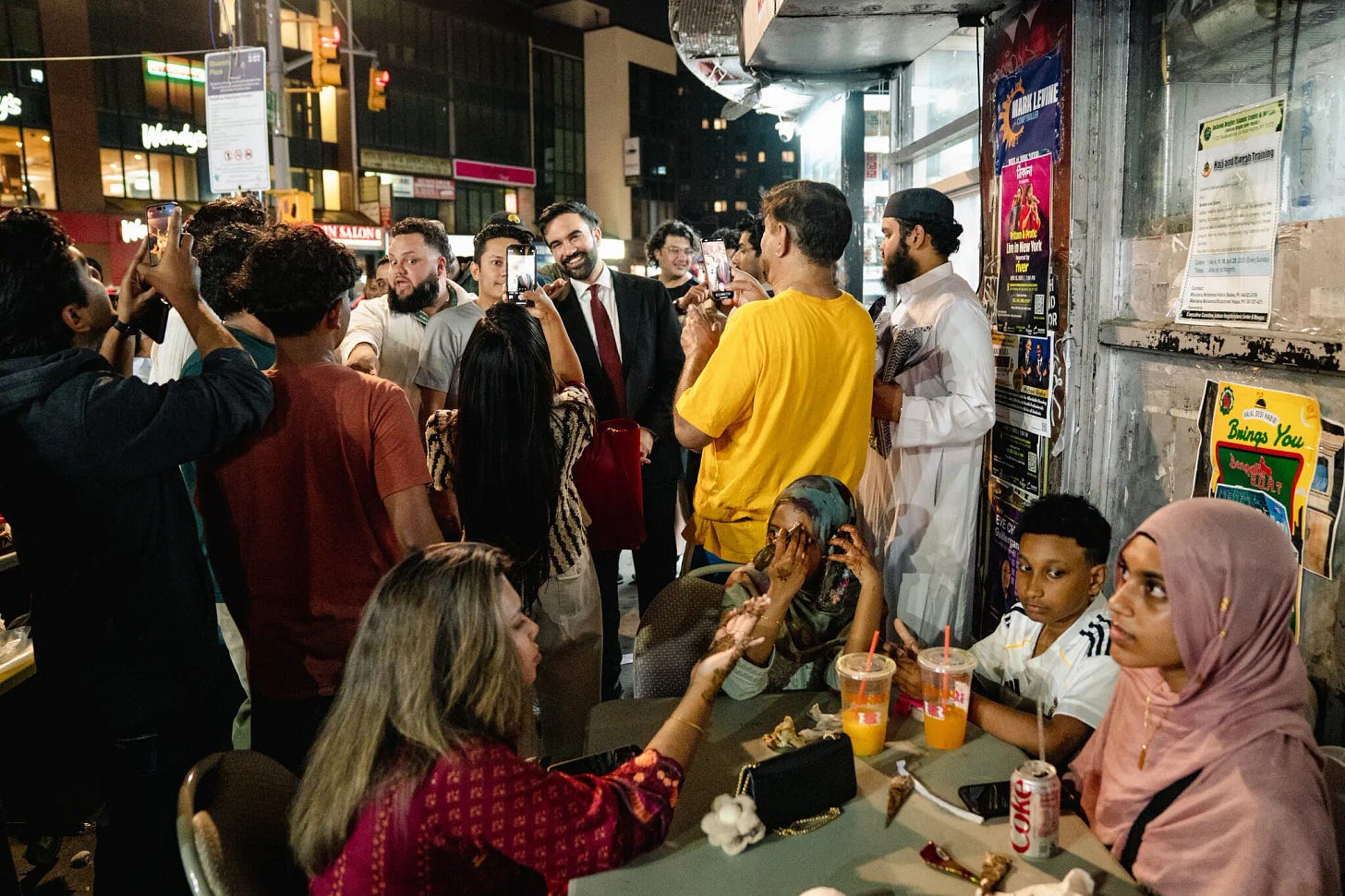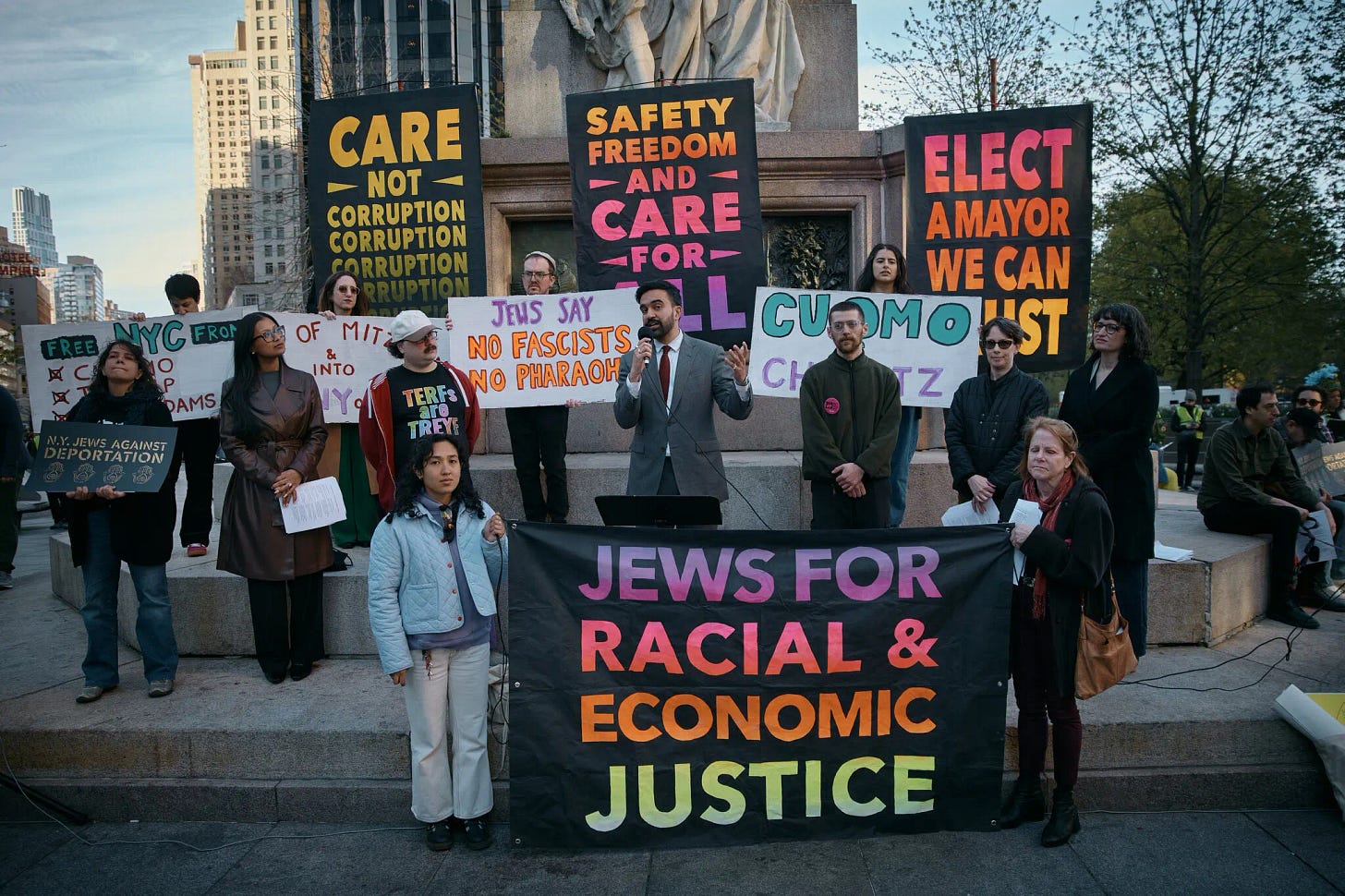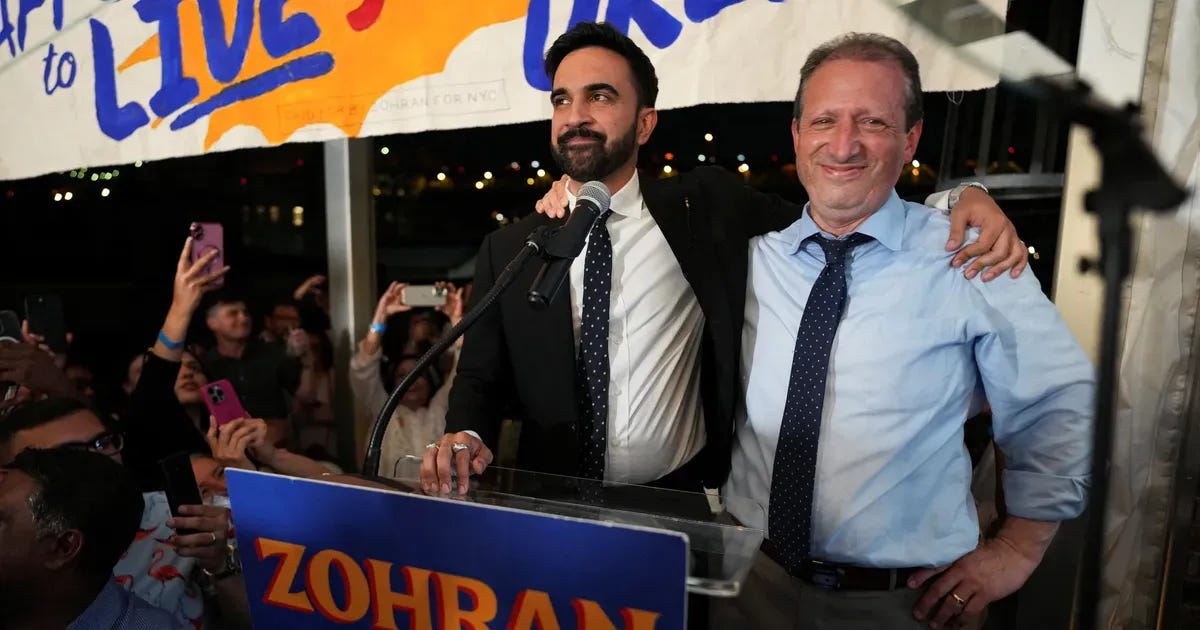Why Zohran Mamdani being Mira Nair's Son Just Makes Sense
How Legacy, Diaspora, and Democratic Socialism Are Reshaping New York Politics
When Mississippi Masala premiered in 1991, starring Denzel Washington and Sarita Choudhury, it showcased a story that remains iconic and essential to this day. The film centred an interracial romance between a Black man and a South Asian woman, exploring the rarely portrayed dynamics between Black and South Asian communities in America. Set in the American South, it followed diasporas grappling with love, migration, and the longing to belong. Beyond its groundbreaking romance, the film also confronted uncomfortable truths, including the pervasive anti-Blackness within South Asian communities—an issue that continues to demand conversation.
I remember watching Mississippi Masala and feeling how deeply refreshing it was to see an interracial love story that didn’t centre a white counterpart. Directed by Mira Nair, the film rejected Hollywood’s standard racial binaries and insisted on nuance and emotional truth between two communities we rarely see interact on screen.

More than three decades later, Nair’s son, Zohran Mamdani, is carving out his own revolutionary space in the halls of political power. A democratic socialist and New York State Assembly member representing Queens, Zohran embodies the same clarity of vision and unapologetic change that defines his mother’s work. He isn’t afraid to talk about class, capitalism, or settler colonialism, and he’s pushing for policies that treat housing, healthcare, and education as human rights, not market commodities.
In a historic win, Mamdani defeated Andrew Cuomo, the former New York governor attempting a political comeback after his sexual harassment scandal, backed heavily by corporate donors and even former president Bill Clinton. New Yorkers took to social media, noticeably taking viral clips from the city’s one minute street show, Sidetalk mocking Cuomo with soundbites like “If she says no, you gotta go,” turning political battles into street-level satire.
Campaigning That Connects
While Cuomo leaned on his network of wealthy donors, Mamdani turned directly to the people, using social media campaigns to connect with voters through his consistent, humorous, and relatable content, showcasing his personality as well as his policies in a way that resonated with younger voters. Gen Z, in particular, responded to his authenticity and clear messaging, helping turn his grassroots campaign into a movement. The billionaire-backed fundraising efforts also raise a larger question of how much money is being funnelled into political advertising, and how much of it could instead be invested in tangible improvements to society? Mamdani’s campaign offered a compelling alternative. Rather than relying on big-money donors, he built a movement powered by people.
On New Years Day, Mamdani waded into the freezing waters of Coney Island in a full suit and tie, then strolled along the beach speaking about policy and tweeting playful puns like, “I’m freezing… your rent as the next mayor of New York City. Let’s plunge into the details.” This smart and layered messaging showed how beneath the humour, Mamdani understands the affordability crisis weighing heavily on New Yorkers. He gives voice to those struggling to hold onto their homes and neighbourhoods, many of which are being reshaped by transplants that often disregard the communities that came before them.
And it’s clear he’s done the work to try to understand the needs of the city more productively. After Trump’s victory in November, Mamdani took to the streets of Queens and the Bronx with a microphone, interviewing working-class New Yorkers about why they voted for Trump, or why they didn’t vote at all. The video has since racked up over 2.7 million views on X, offering a rare and unfiltered look at political disillusionment from the ground up.
Months later, nearly 50,000 volunteers joined Mamdani’s effort, knocking on doors across the city, while small-dollar donors helped him break fundraising records. He also made it clear that sometimes substance and facts can outshine spectacle. At one Democratic debate, Mamdani directly confronted Cuomo’s scandal-ridden past and policy failures pointing to the fact that he’s “never had to resign in disgrace.” It showed that authenticity and candid truth still have the power to break through, even in a media landscape dominated by noise and money.
From Kampala to Queens
Zohran Mamdani comes from a family of wonderfully intellectual people. Whilst his mother is an Academy Nominated filmmaker, Mamdani is also the son of Mahmood Mamdani, one of Africa’s most influential scholars on colonialism.
His transnational identity and political consciousness were shaped early on. In 1972, Ugandan dictator Idi Amin launched a brutal purge of the country’s Asian population, forcing Mamdani’s father into exile. Years later, while attending a conference in Dakar, his father’s Ugandan citizenship was revoked by Milton Obote’s government, rendering him stateless. He didn’t return until 1986, just five years before Mamdani was born. These experience no doubt left an imprint in Mamdani’s views and also exposed him to the concepts of migration, displacement, and cultural diversity at a very young age. Grounded by parents who navigated these challenges with intellectual and creative force, Mamdani absorbed the importance of community, even during times of political turmoil. His own movements between Africa and the United States gave him a lived understanding of the diasporic existence, an identity shaped by shared struggle, resilience, and solidarity.
While it is clear his father influenced his upbringing, his mother’s films definitely also influenced crucial values. Mira Nair, being the influential feminist filmmaker she is, incorporates layers of social and political commentary to her films, tackling issues such as sexism and classism, exploring themes of identity and belonging specifically in the South Asian community. That same sense of layered, global awareness is evident in Mamdani’s politics. He brings a broad, intersectional lens to his work, unafraid to share his views outside of the U.S such as his criticism of Indian Prime Minister Narendra Modi and openness to voicing his pro-Palestinian stance.
Influenced by his father Mahmood Mamdani’s anti-colonial scholarship and activism, and grounded in his mother Mira Nair’s mantra, “If we don’t tell our stories, no one else will,” the newly elected Mayor of New York carries forward the best of both legacies of political clarity and creative courage.
Speaking to the Diaspora
Born in Uganda to Indian immigrant parents, Mamdani moved to New York City when he was just seven years old. His multiculturally rich background and upbringing actually represents and reflects a lot of New Yorkers.
Mamdani’s win reflects New Yorkers through and through, representing the journey many people of the diaspora go through. For many African and Asian diasporas, his journey and vision for the most diverse city in the United States speaks to people’s lived experiences navigating the realities of New York and the entire country, offering a global perspective embedded in the collective experience.
After Trump’s victory in November, many left-wing Democrats argued that the lesson wasn’t that the country had shifted further to the right, but rather that the Democratic Party needs a new, bolder approach to politics. Grassroots Democrats, in particular, are calling for a more ideological and confrontational stance that refuses to cater to corporate interests or centrist compromises. For many young voters, Zohran Mamdani embodies that shift and a new way forward. His personable nature and ability to connect with everyday people have made him a relatable and resonant figure.
Mamdani has secured over $100 million in state funding to improve subway service and launched a fare-free bus initiative aimed at boosting ridership by 30%. His vision for the future clearly centres community first. As a leading voice in the “Fix the MTA” campaign, Mamdani connects transit equity directly to racial and economic justice. Some of his key proposals include:
Rent freezing for millions of rent-stabilized New Yorkers.
Affordable housing plans to build 200,000 new units, rehabilitate public housing, and reinvest in campus tax exemptions.
Universal childcare including baby baskets for new parents.
Raising the minimum wage to $30 per hour by 2030, funded through increased wealth and corporate taxes.
City-owned grocery stores through the “Roti, Kapda, Makaan” campaign, with one store in each borough to combat food insecurity
A public safety plan that reallocates funds from the NYPD to social workers and mental health–focused teams, offering more effective community-based solutions for violence prevention in the city.
All these initiatives aim to create a safer, more affordable, and equitable life for New Yorkers.
Building Unity Beyond Identity
While many New Yorkers, and citizens across the United States, are celebrating Mamdani’s win, others have expressed strong opposition. Some members of the right-wing Hindu community, segments of New York’s Jewish community, and right-wing American conservatives have been publicly vocal in their disapproval. Critics have frequently pointed to Mamdani’s Muslim faith and immigrant background in an attempt to question his legitimacy and discredit his bid for mayor, framing him as not a “true American,” a tactic rooted in xenophobia rather than substantive political critique.
Naturally, Mamdani’s stance on the war in Gaza has required a careful balancing act. As a representative in one of the most diverse cities in the world, he has worked to condemn rising antisemitic hate crimes targeting New York’s Jewish community, while also speaking out against anti-Muslim rhetoric and violence, issues deeply felt by many of his Muslim constituents. His efforts to acknowledge the pain and concerns of both communities have, in turn, drawn criticism from both sides.
This tension isn’t entirely unexpected. Given his parents’ long history of political engagement, particularly his father’s scholarship on settler colonialism and human rights, Mamdani and his family, have increasingly become a target for Islamophobic threats as well as attacks from the right, who attempt to frame his positions as disruptive and a threat to the safety of New Yorkers and democracy as a whole.
Yet even in the face of targeted attacks and ideological backlash, Mamdani has embraced community building and reassured New Yorkers that antisemitism and hate crimes against any community will be taken very seriously. His responses to critics hasn’t been marked by defensiveness, but by unity and a refusal to let identity be weaponized to divide.
In a time of deep polarization over the war in the Middle East, and rising tensions shaped by religious bias and political division, it’s refreshing to see two politicians bridge those divides. Just ahead of early voting, Zohran Mamdani and fellow progressive candidate Brad Lander publicly endorsed one another, demonstrating a shared commitment to principled politics despite their differing backgrounds. The two later appeared together on The Late Show to explain why they chose to cross-endorse each other, emphasising solidarity, shared values, and the urgency of building coalitions that rise above identity-driven divides.
They explained that their alliance was, in part, a move to prevent Andrew Cuomo, a leading candidate for mayor, from regaining power. Both praised each other’s legislative records and emphasized their shared commitment to inclusive governance. While acknowledging their differing identities, they also underscored common ground, including their support for Israel’s right to exist. “Look, no mayor is going to be responsible for what happens in the Middle East,” Lander noted. “But there is something quite remarkable about a Jewish New Yorker and a Muslim New Yorker coming together to say, ‘Here’s how we protect all New Yorkers.’”
Given that Brad Lander is New York City’s comptroller, responsible for overseeing a $275 billion pension fund, and Zohran Mamdani is a democratic socialist, their cross-endorsement might seem unlikely at first glance. But their shared commitment to accountability proves otherwise. As Mamdani explained on The Late Show, “What Brad has also shown, by being the money guy, is holding people accountable.”
Mamdani also emphasized the strength of New York’s diversity, saying, “For so many of us who have grown up in this city, difference is something that we celebrate. It’s part of the fabric of this place we call home.” His words echoed a broader truth about New York in that that its richness lies in the coexistence of countless cultures, identities, and experiences.
A Hopeful Future
Mamdani’s mother, Mira Nair, shook things up with many of her films but especially in Oscar nominated Monsoon Wedding, a film that bravely tackled difficult subjects like child abuse and complicated family dynamics. The film faced criticism from parts of the Indian community for exposing uncomfortable, persistent issues that often get brushed under the rug. Similarly, Zohran Mamdani isn’t afraid to confront uncomfortable truths. Whether challenging right-wing politics worldwide, criticizing dictatorships, or unapologetically advocating for socialist policies, Mamdani unsettles wealthy elites and powerful politicians. Like his mother, he speaks boldly for his community, refusing to shy away from the hard conversations that many avoid.
Ultimately Zohran Mamdani sold a vision of hope. Instead of giving the people something to vote against, he gave them something to vote for.
Tuesday’s primary win is a significant milestone, but it’s only the beginning. New Yorkers will need to show up with the same energy and conviction in November, when Mamdani could face formidable opponents like Eric Adams, and possibly even Andrew Cuomo again. Electoral victories matter most when they lead to real, lasting change in people’s lives. With this win comes a profound responsibility to turn momentum into policy, and vision into reality.








